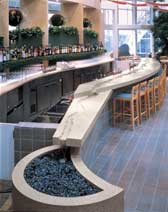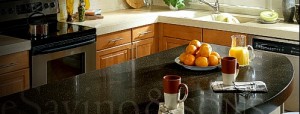In 1954, Nicholas DeSavino emigrated from Italy to Northeastern Pennsylvania and sought to support his family with a small woodworking business. His specialty was building simple, affordable cabinets and furniture.

Solid surface continued to dominate DeSavino’s product offering until around the turn of the century when it became apparent that natural stone was on the rise as the countertop material of choice. Accordingly, DeSavino and Sons opened a stone shop to complement the existing solid surface facility. By that time, Nicholas had passed away and his three sons, Pat, Dino and Mario, formed a corporation to assume ownership of the business.
Today, the company sells solid surface and stone countertops primarily to dealers in the southern tier of New York state. Additionally, the company fabricates solid surface and stone for commercial projects.
Diversifying Into New Materials
“We also do some OEM work for a manufacturer that makes cabinets for the medical industry,” explains Dino DeSavino, president of the company.

According to Dino, the polyethylene sheets are much softer than solid surface, but by adjusting feed and speed rates they are able to process the panels on the same CNC equipment used to fabricate solid surface. “It took a good year to get everything worked out and go through testing and everything,” he says, “but it worked out well. About 80% of these cabinets go to Saudi Arabia.”
Surviving The Downturn
Dino says that servicing a mostly rural clientele has its share of ups and downs. “When the recession hit we still had a good backlog of business at the same time fabricators in bigger cities were really feeling the crunch,” he says. “We almost thought we had bypassed the downturn. Then it hit us hard and the work dried up. Now that things are starting to come around again in the cities, it is coming back slower out here in the more rural areas.”
Like most businesses during the economic downturn DeSavino and Sons increased its market area during the recession in an effort to bring in enough business to keep the operation going. The company also looked for ways to become more efficient without lowering the quality for which it had become known among its dealer customers.
“I think the biggest thing we did was to buckle down and watch expenses,” Dino says. “Like everyone else we had to lay people off and we got more efficient. Moraware helped us quite a bit with that, especially in keeping track of inventory in our two locations.”
Want to know more? At Moraware, we make software for countertop fabricators. CounterGo is countertop drawing, layout, and estimating software. JobTracker is scheduling software that helps you eliminate the time you waste looking for job folders. RemnantSwap is a free place to buy and sell granite remnants with fabricators near you.
